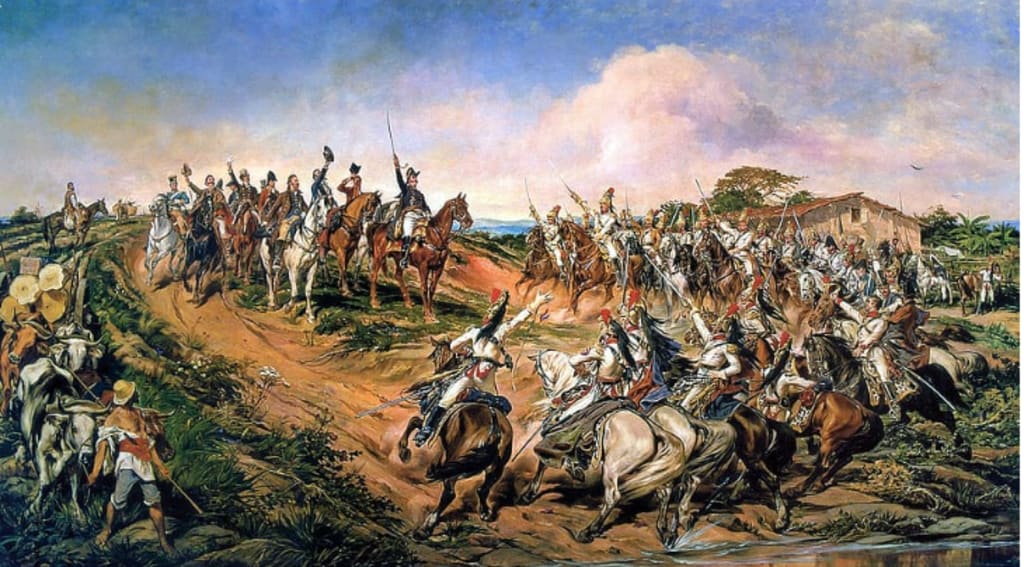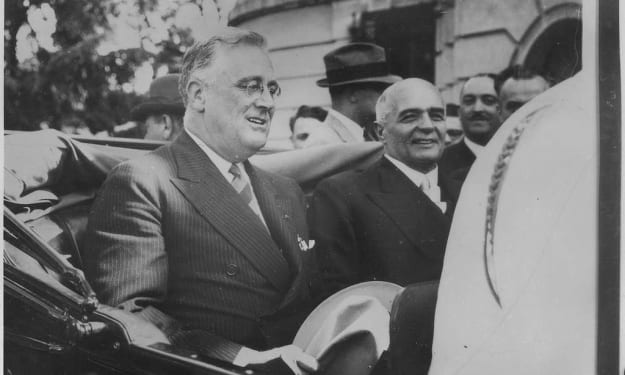Independence of Brazil and Its Historical Journey
This article delves into the colonial history, marking the arrival of the Portuguese in Brazil in 1500, followed by centuries of colonial exploitation. Additionally, it examines the establishment of the Brazilian Empire and the eventual shift to a republic in 1889. This article also highlights the enduring impact of Portuguese culture, language, and the influx of African slaves on Brazil. In summary, it will provide historical insights into Brazil's journey to independence and its historical ties to Portugal.

The history of Brazil is closely linked to its fight for independence from Portuguese control. The Portuguese Annexation represents a pivotal moment in Brazil's path to liberation. It established the groundwork for a lengthy and challenging battle that would ultimately result in the creation of a new nation.
This article delves into the colonial history, marking the arrival of the Portuguese in Brazil in 1500, followed by centuries of colonial exploitation. Additionally, it examines the establishment of the Brazilian Empire and the eventual shift to a republic in 1889. This article also highlights the enduring impact of Portuguese culture, language, and the influx of African slaves on Brazil. In summary, it will provide historical insights into Brazil's journey to independence and its historical ties to Portugal.
Brazil before the Arrival of Europeans:
Approximately two to six million indigenous Native Americans lived in Brazil at the time of European contact in 1500. Tupian-speaking Native Americans inhabited the coastal areas and were among the more significant groups within the tropical forest.
Please CLICK HERE for more fascinating Historical Events in short brief.
The native peoples in Brazil had a strong connection to the land and lived in harmony with nature. Indigenous peoples in Brazil deeply respected the natural world and understood how important it was to live sustainably. They passed their knowledge of the land and its resources down from generation to generation, making sure their way of life continued.
However, when the Europeans arrived, things took a terrible turn for the indigenous peoples of Brazil. They brought diseases, made people work against their will, and used violence, which led to unhappiness to the indigenous communities.
Arrival of Portuguese in Brazil:
Portuguese colonial presence began in the year 1500 when the Portuguese explorer Pedro Álvares Cabral landed on its shores (April 22, 1500). For the next three centuries, Brazil remained a colony of Portugal, primarily serving as a source of valuable resources like sugar, gold, and diamonds. During this period, there was the brutal exploitation of indigenous populations, and African slaves were brought in to work on plantations.
It's worth noting that Brazil first started relying on slavery as a Portuguese colony in the 16th century. Over the next 300 years, approximately 4.5 million Africans were transported to Brazil as slaves, making them one of the largest segments of Brazilian society.
In 1808, a significant event occurred in Brazil when the Portuguese royal family, led by Dom João VI, left their homeland due to issues with Napoleon. They relocated to Rio de Janeiro and established their government there. This marked the beginning of a process that eventually led to Brazil gaining its independence. In 1822, Dom Pedro I declared that Brazil should break free from Portuguese rule, ending over 300 years of Portuguese control.
Once Brazil gained its independence, they needed a leader. So, Dom Pedro I became the Emperor of Brazil in 1822. Prior to that, he held a position similar to that of a prince while his father, King Dom João VI, was in Brazil. He became the first ruler of the Brazilian Empire and remained in power until 1831 when his young son, Dom Pedro II, assumed the throne. This empire continued until Brazil became a republic in 1889.
Establishment of Brazilian Republic:
The collapse of the Brazilian Empire and the rise of the republic marked a significant turning point in American history, ushering in a new era of governance and social change in the nation. Inspired by the ideals of the American and French Revolutions, the Brazilian people began to question their subjugation and desire self-governance.
The Brazilian Empire, under the rule of the Portuguese monarchy since its declaration of independence in 1822, came to an end in 1889 with the establishment of the Brazilian Republic.
This transition was characterized by a growing dissatisfaction with the monarchy's leadership, driven by economic, social, and political factors. Many Brazilians, including military leaders and intellectuals, called for the monarchy's abolition and the establishment of a republic. On November 15, 1889, a military coup led by Marshal Deodoro da Fonseca resulted in the overthrow of Emperor Dom Pedro II, who went into exile in Europe.
The establishment of the Brazilian Republic replaced the monarchy, and Brazil adopted a republican form of government. Marshal Deodoro da Fonseca became the country's first president. This shift in governance was accompanied by the adoption of a new constitution and the modernization of Brazilian institutions.
The Portuguese Period: Oppression and Aspiration:
After the expulsion of the Dutch by the Portuguese, they proceeded to settle the vast expanse of Brazil's territory and exploit its resources further. Alongside enslaved Africans engaged in sugar production in the Northeast, explorers discovered gold and diamonds in an inland region known as Minas Gerais (General Mines).
The Portuguese attempted to enslave Indigenous people, but, unaccustomed to enduring long hours of labor in the fields and susceptible to European diseases, many natives either retreated deep inland or succumbed to illnesses. (At the time of Cabral's arrival, it was believed that the indigenous population numbered more than 3 million; today, the figure stands around 900,000 people or 0.4% of Brazil's population)
In instances where indigenous populations resisted, the Portuguese responded with even greater brutality. Nonetheless, some indigenous communities persist in Brazil today and continue to advocate for their rights.
The Expansion of Portuguese Language: A Cultural Legacy
Many Portuguese individuals came to Brazil over the years in search of employment and opportunities. While some Portuguese had been present in Brazil since its early history, a larger wave of migration from Portugal to Brazil occurred during the 18th century, often without significant government support.
The presence of Portuguese people in Brazil is attributed to their migration to the Americas. In the 16th century, the first Portuguese-speaking settlers arrived in Brazil, but during that time, Portuguese was not widely spoken. However, by the 18th century, Portuguese became the official language of Brazil.
The Portuguese language has undergone substantial changes since its introduction to Brazil in the 16th century, both in Portugal and in Brazil itself. Over 100 million people in Brazil have some family connection to Portugal. Most of them also have ancestors from other groups, like Africans, Indigenous people, Italians, Spanish, Germans, Arabs, and more.
Modern Brazilian culture is a blend of Indigenous Indian, African, and Portuguese influences. Of these, Portuguese culture is the most influential, as it contributed to Brazilians adopting their language, primary religion, and many customs. Brazilians speak Portuguese because Brazil was colonized and settled by the Portuguese for an extended period of time.
After a lengthy and challenging conflict, Brazil successfully gained independence from Portuguese control on September 7, 1822. However, the path to establishing a fully developed democracy has been filled with difficulties.
Brazil remains firmly dedicated to democracy and the loyalty to laws. The Federal Constitution establishes the principles of human dignity and democracy as the fundamental values of the Brazilian Republic.
Deforestation of the Amazon in Brazil:
The Amazon rainforest, often known as the "Lungs of the Earth," is one of Brazil's most valuable natural assets. Deforestation in the Amazon in Brazil decreased by 66.1% in August 2023, the lowest level since 2018. Satellite data from Brazil's space research agency (INPE) showed that 563 square km of rainforest were cleared, a significant drop from last year. Overall, deforestation in the first eight months of this year is down by 48% compared to 2022.
President Luiz Inacio Lula da Silva, who aims to end deforestation in the region by 2030, is pleased with these results. Some were worried that deforestation might increase in August and September due to drier weather, but that hasn't happened so far.
Deforestation harms biodiversity, indigenous people, and the environment, causing problems like fires, CO2 emissions, and soil erosion. Despite recent progress, more steps are needed to protect the Amazon.
Brazil's independence from Portuguese rule marked a pivotal moment in its history. Fueled by a desire for self-governance, this struggle shaped Brazil into the vibrant nation it is today. The growth of the Portuguese language, the diverse indigenous heritage, the establishment of democracy, and the ongoing challenges of Amazon deforestation are all integral to Brazil's historical journey.
Please CLICK HERE for more fascinating Historical Events in short brief.
About the Creator
Mohammed Shahidullah-Bin-Anwar
Mohammed Shahidullah, a Blogger, writes on Historical News. After completing Master's in Bengali from Dhaka University, I accumulated over 15 years of experience in various private companies. Plz visit TIME PRINTER, you will not be upset.
Enjoyed the story? Support the Creator.
Subscribe for free to receive all their stories in your feed. You could also pledge your support or give them a one-off tip, letting them know you appreciate their work.






Comments (1)
The writer of this article has done an excellent job providing a comprehensive overview of Brazil's complex history, from its colonial past to its struggle for independence and its modern challenges. The article's clear and informative narrative not only highlights key historical events but also emphasizes the enduring cultural and environmental impacts on Brazil. It's a well-researched and insightful piece that offers valuable insights into the rich tapestry of Brazil's history.